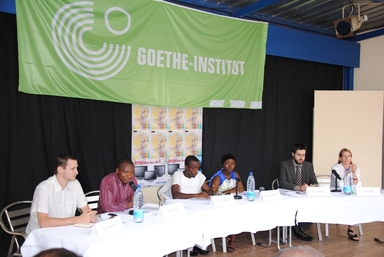| More Women to delve into film directing Will Yaounde women’s film festival be platform? |
| Thursday, 04 March 2010 09:43 |
|
Usually, they would prepare the beautiful costumes and make sure the actors are properly clad in them. They would display their make-up prowess on actors' faces, giving out just what the director desires. Perhaps, their most significant role is "welfare". Since actors and directors are red carpet personalities, the women make sure they are well fed, taking into consideration quantity and quality. Unfortunately, the role of women, for over 40 years has not gone beyond these. They have hardly stood behind the cameras to call the shots. Ask why it is an issue. It is established that directing is the most prestigious aspect of filmmaking. So, does it mean when it is juicy, women should be left out, whereas, directing is something they too can do? This is a reflection that has inspired GIC VIDEO STAR, a film common initiative group, mostly made up students of the Performing Arts and Cinematography Department of the University of Yaounde I. To get women on board and encourage them to direct films, the CIG is organizing a festival to their honour. Dubbed Mis Me Binga, the festival will take place in Yaounde from 4 to 8 March 2010, with three major aspects: a round-table conference to discuss strides women have made and how far they could go, film projects and film contest. Dozens of films (including some from English-speaking Cameroon), directed and produced by women have been lined up for projection at the Goethe-Institut, the French Cultural Centre and the Nkomkana Youth Centre in Yaounde. Also on the programme will be films from other countries including Namibia, Germany, Israel, Finland, Spain, Canada and Japan. Sixteen of the films lined up for projection will contest in three chosen categories: best fiction, best documentary and best actress. At a press conference last week in Yaounde, organizers of Mis Me Binga hoped the initiative would change the current phase of film making, not only in Cameroon, but in the Central African sub region and the rest of Africa. "We think women have potentials that must be exploited. So why shouldn't they get behind the cameras and direct the films?" GIC Video Star's Martial Nguea questioned rhetorically. To him, Mis Me Binga which has come to stay should face the challenge and get female filmmakers out of the doldrums of unpopularity as far as directing is concerned. Otherwise, Nguea didn't why in 40, the country would only boast of about 15 female filmmakers, producing not more than two films per decade. "We think the time has come to redress the situation," the young film maker said. The first edition of Mis Me Binga is now a reality, thanks to partners including the Ministry of Culture, Ministry of Women's Affair and the Family, the Embassy of the Federal Republic of Germany, the Goethe-Institut Kamerun and French Cultural Centre. Media partners such as Vox Africa, Vision 4 and Radio Campus have also been prominent. Some films on the Mis Me Binga schedule: · Sister in Law (Cameroon) by Kim Longintho & Florence Ayissi · Bongfen (Cameroon) by Sunjo Petra · The Last Bus (Germany) by Maria Hensse · Nairobi Love Story (Gernmany) by Maria Weber · Lily Festival (Japan) by Sachi Hamanu · Rape (Cameroon) by Naah Joyce · Cries at Night (Namibia) by Oshesheni Hiveluah KAM by Astrid Atodji · La Divorce (Gabon) by Manouchka Labouba · Dans l'Ombre d'une autre (Cameroon) by Francine Kemegni |

LATEST COMMENTS
 Well, I think the CEA was a very shallow and misgu... More...
Well, I think the CEA was a very shallow and misgu... More... This is creativity we are talking about, this are ... More...
This is creativity we are talking about, this are ... More... Lovelyn,your pre-selection criterias are ok but i'... More...
Lovelyn,your pre-selection criterias are ok but i'... More... camhood 4 the better More...
camhood 4 the better More... fame is gd More...
fame is gd More... CONGRATULATION. THANK GOD FOR YOU GUYS. CAMEROON S... More...
CONGRATULATION. THANK GOD FOR YOU GUYS. CAMEROON S... More... cool girls dat was great but this year we the cons... More...
cool girls dat was great but this year we the cons... More...
RECENT Articles
- Learn the Energetic Benskin Dance in Just One Minute
- Eyum Anneh's "Erome Mohwa" Explores Rich Manyu Culture
- MOVIES: COLUMBUS BRACES FOR “WHEN LOVE HAPPENS” PREMIERE
- JZyNo Takes Over Buckeye State with Explosive EP Debut
- COLUMBUS: TATA KINGE PROMISES ROUSING CONCERT
- EYOL’A COLUMBUS PRESIDENT, SG, TALK ABOUT GROUP’S OFFICIAL OUTING
- MUSIC: HAITIAN A-LIST SINGER BRACES TO HOLD COLUMBUS SPELLBOUND
- GOSPEL: MORE FOLLOWERS FOR QUINCY BELL’S “FOLLOW YOU DE GO” SINGLE
- MOLA MONGOMBE TO VIBRATE COLUMBUS
- MUSIC: Ko-C TO THRILL COLUMBUS
- HALF HEAVEN in Cameroonian theatres soon
- HALF HEAVEN GOES TO CINEMAS
- CINEMATIC SUCCESS! REVIEWING Korto Davis’ EVIL LIVES HERE
- WOMEN: FINDING THE PATH
- CAMEROON: AS URBAN MUSIC GROWS…
- Rainbow
- Under the moon light
- BLESSED WITH MULTIPLE SKILLS
- COUNTDOWN: HALF HEAVEN BEGINS JOURNEY TO THE SCREENS
- Anita Etta Ministries announces music video release
- GWENDOLINE THE SOLO TOURIST
- WHEN TRAVELING BECOMES A HOBBY
- MADE IN AFRICA
- Apex Snapshot: SHOW OPENER BLACK IMMIGRANTS & AMERICA
- BLACK IMMIGRANTS & AMERICA
Popular Articles
- Official: CEA gets thrilling trailer
- “Our intense campaign strategy and immense public support played the trick” - Cynthia Tabe, publicist for MTV Awards laureate Stanley Enow
- “Waa Musi has no authority to convoke a GA of CFI” - Otia Vitalis, CFI board chair
- “We’re bent on developing creativity in kids” - Miranda Ejang Tatabod, creative director, MIMS KIDDIES CENTER, Douala
- Retour: C-Boyz release Feel My Pain today
- LIA explains born again status in new Single
- African gospel: New single entrusts health, security crisis in God’s hand
- Bertoua: Orphans gratify Chris Fomunyoh in touching melody
- Stanley Enow, JOVI in-roads: A Look from the other side of the Mungo
- Cameroon bids bye to fallen heroine, hero
- Star wedding: Alexis E celebrates spouse in love masterpiece
- Vanity Fair Vs Vain Fraud
- Neba Lawrence in Cape Town
- Immortalizing Zachary Nkwo: The football commenting paragon I knew
- Bazore Releases New Album

 Though considered as embryonic, Cameroon's film industry is four decades old. Within this period, there has been a remarkable involvement of women. There is hardly any artistic or technical crew that sets out for a movie project without women on board. Their presence at locations is always significant.
Though considered as embryonic, Cameroon's film industry is four decades old. Within this period, there has been a remarkable involvement of women. There is hardly any artistic or technical crew that sets out for a movie project without women on board. Their presence at locations is always significant.